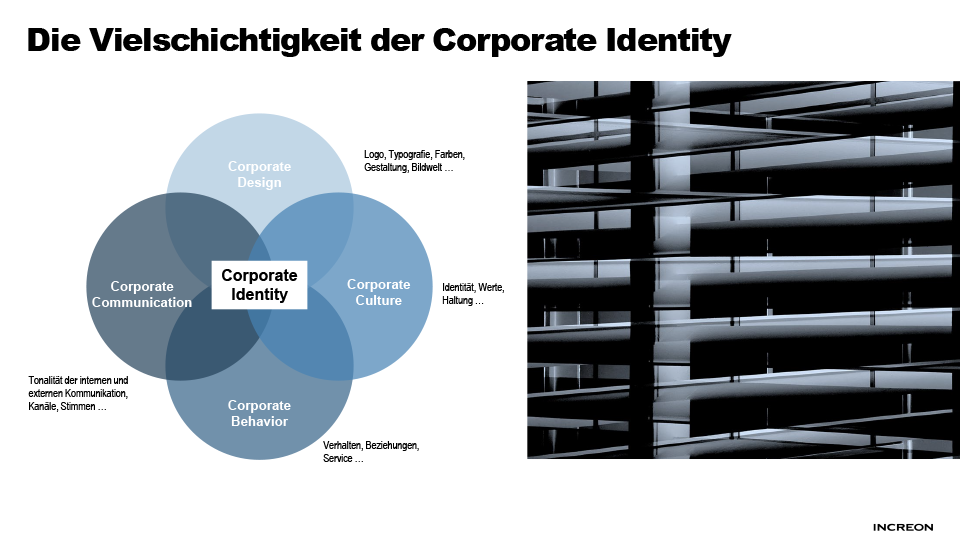

Corporate Identity
Corporate identity is the creative essence that gives a brand soul, giving it an unmistakable direction on the road to success. And it is the tool in brand management for expressing structures, content, and corporate personality. In short, corporate identity is a strategic market and social element of brand management.

CORPORATE IDENTITY.
The sum of corporate design, corporate communication, corporate culture, and corporate behavior.
Corporate identity. Expression of an authentic wholeness.
Every company has a corporate identity. Every company has a relationship with employees, suppliers, customers, or investors. An image of the company is formed from these interactions. Because of the diverse interactions, companies are perceived as personalities, as living entities. This extends to the company’s international presence and the perception of its corporate identity on the global stage.
The approach to corporate identity (CI) requires an analysis of self-image and external image, followed by strategic derivations. This includes the review and development of the B2B brand along with internal marketing communication for employer brand and brand message. Implementation, motivation, and training play a central role before external marketing communication follows. A continuous review process accompanies this journey, supported by an experienced corporate identity team in a B2B branding agency.
Corporate identity as an element of international brand management
Corporate identity as an element of B2B brand management does not require constant change, just as a person does not continually reinvent himself or herself. Nevertheless, it is essential for B2B companies to regularly reflect on whether their identity fits the current reality. In an international and intercultural environment, B2B companies need to rethink whether their corporate identity is seamlessly transferable to the new realities. As a corporate identity agency specializing in B2B communications, we offer support in this analysis as a sparring partner.
When a mid-sized B2B industrial company grows technologically, this development must be reflected in its communications — from advertising to personal sales pitches, from the website to international trade fair presentations. As the company expands and acquires new customers, the B2B brand must be reviewed to see if it meets international and intercultural requirements. A consistent corporate identity as a common thread is crucial for a clear and recognizable image.
Authenticity creates credibility.
In brand communication, B2B companies achieve authenticity when the brand promise is perceived as genuine and credible by international markets. As a branding agency, we capture the brand’s core and inner values to develop an authentic brand personality.
Corporate identity as an element of brand management
Today, there are numerous brand models. However, new terms often mask familiar branding expertise. As a branding agency that thinks long-term and for which sustainable values count, the established corporate identity model has its place in our range of services.
- At the center is the corporate identity, which is supported by the brand core, brand values, and brand personality, in which the positioning is articulated and tonality expressed.
- The corporate design visualizes the company and brand personality in all its diversity — logo design, appearance, visual language, key visual, digital branding, 3D branding, sound branding, etc.
- Corporate culture refers to shared values, beliefs, behaviors, and norms that shape the internal atmosphere of an organization and influence how employees interact, make decisions, and pursue common goals. It reflects the identity of the company and guides its entire atmosphere and work culture.
- In addition to core statements on corporate wording and press relations, corporate communication today primarily includes holistic content marketing strategies from which the content for marketing communication can be derived — campaign formats, statements for exhibitions and trade shows, activities in social media, sales, etc.
- The activities in the field of corporate behavior are directed inwards and make a fundamental contribution to ensuring that employees bring the brand personality to life as brand ambassadors. This has an impact on the employer brand so that suitable individuals can be recruited for the company. Corporate behavior also shapes the customer journey and the customer’s brand perception at the various customer touchpoints.
Corporate identity as a driver for intercultural success
A strong and authentic corporate identity plays a prominent role for B2B companies in international markets, especially with regard to intercultural aspects. It not only acts as a company’s business card, but also shapes the overall image and perception of the brand in different cultures and regions. This is of crucial importance for several reasons:
- A clearly defined corporate identity provides consistent direction and orientation in a B2B company. In a global environment with different cultural norms and values, it creates uniformity while facilitating communication and understanding of the brand. This helps to build trust and ensure that the company is perceived as a reliable partner.
- A well-thought-out corporate identity makes it possible to address different target groups in different countries in a targeted manner. It takes into account cultural sensitivities, communication styles, and aesthetic preferences, which increases the chances of building relationships and strengthening business relations.
- An authentic corporate identity underscores credibility and reliability. Cultural sensitivity and adaptability show respect for local conditions and demonstrate a deep understanding of customers’ needs. As a result, the brand is perceived as responsible and adaptable.
- A consistent corporate identity acts as a guideline for all internal and external interactions. It helps to communicate consistent messages and ensure a seamless brand experience across all touchpoints. This is crucial as consistent messaging builds trust and enables clear positioning in a highly competitive global environment.
Overall, corporate identity plays a central role in how B2B companies are perceived in international markets. A strong identity that takes intercultural aspects into account not only gives the brand uniqueness, but also creates the basis for sustainable business relationships and long-term success in a diverse and global business world.





